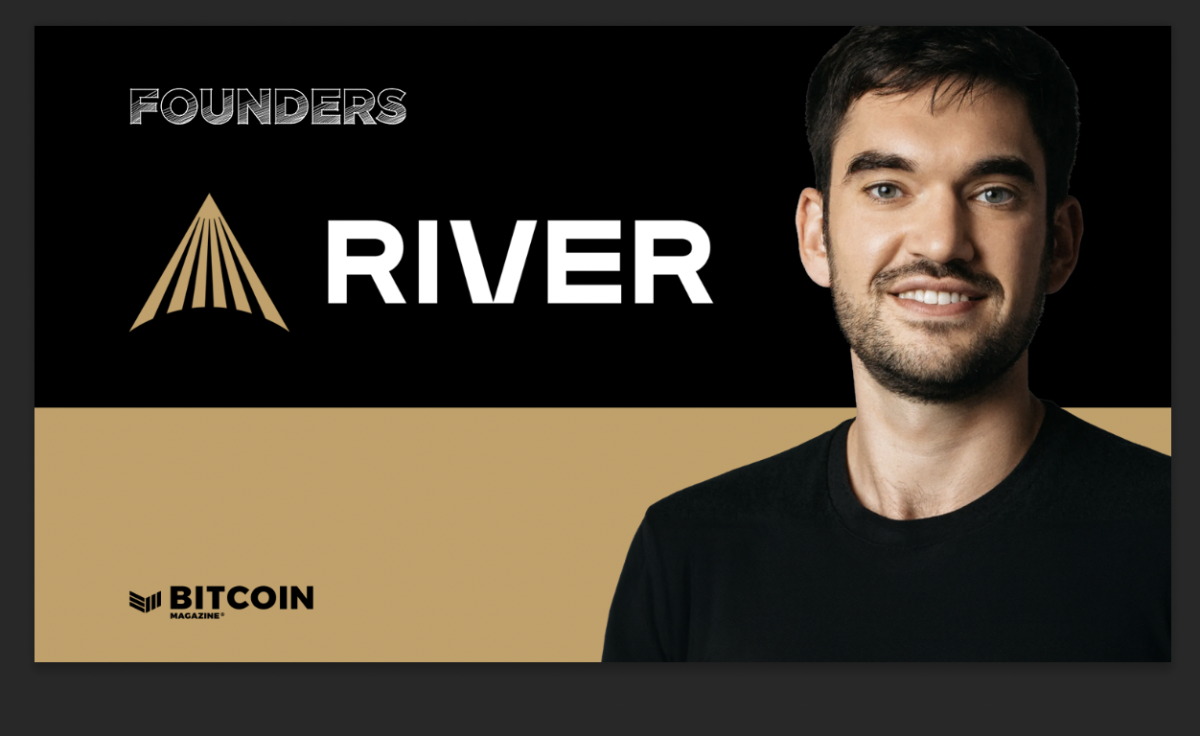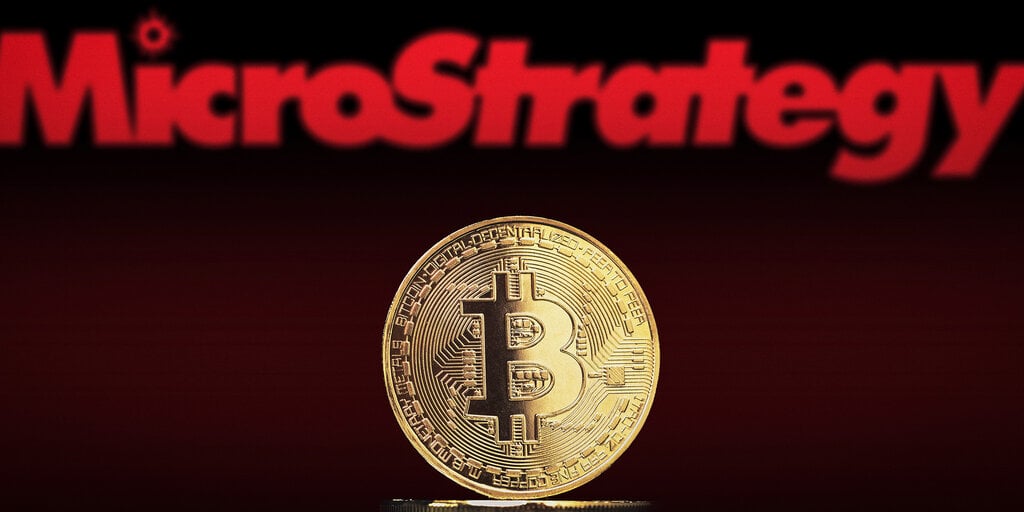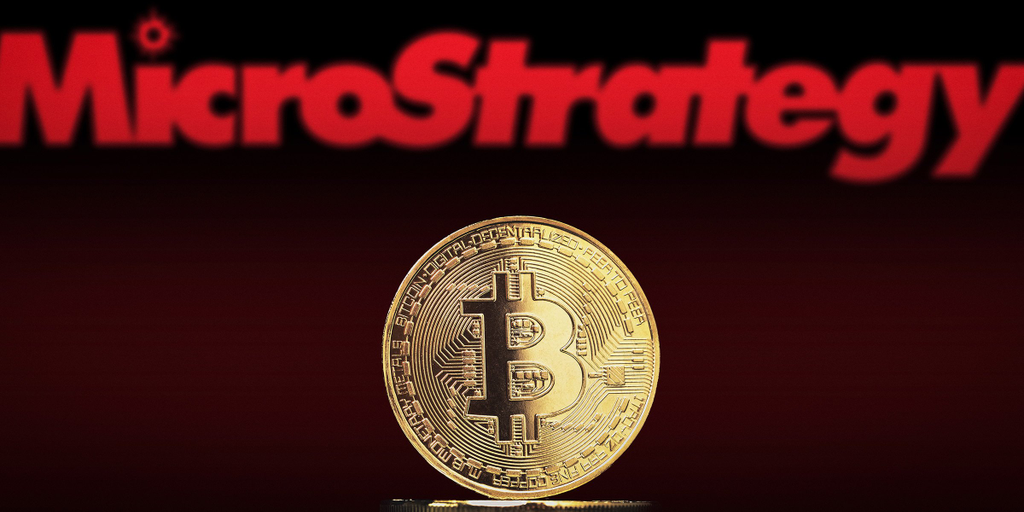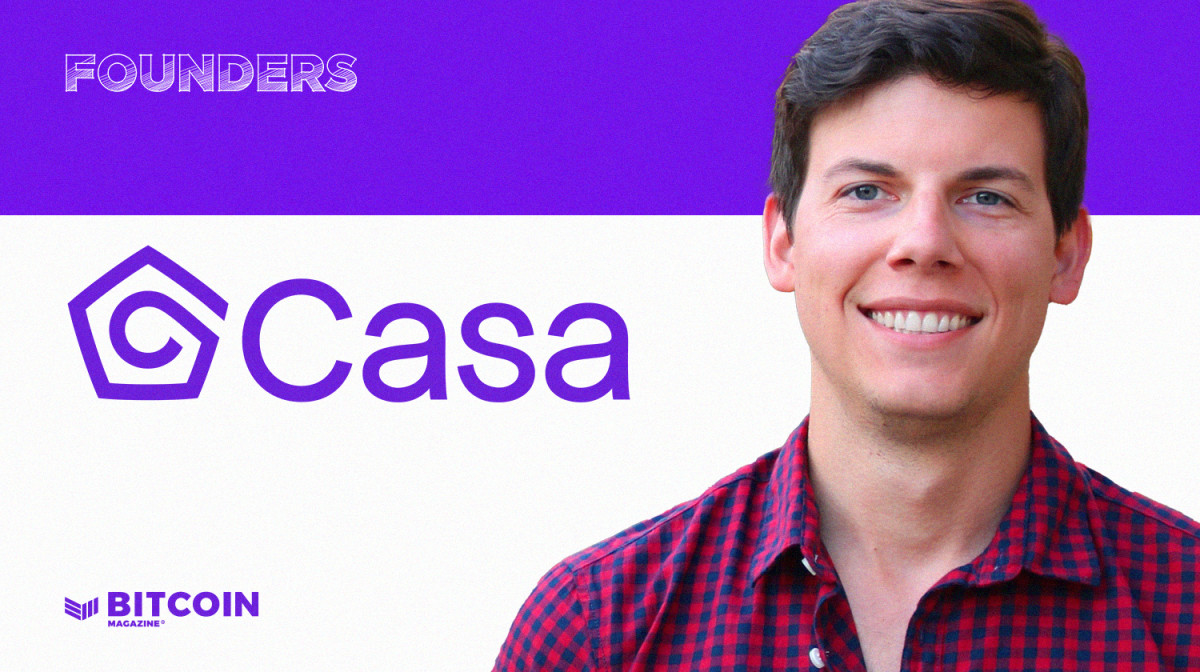business
River: A Bitcoin Brokerage Built From The Ground Up
Published
3 months agoon
By
admin

Company Name: River
Founders: Alexander Leishman
Date Founded: February 2019
Location of Headquarters: Columbus, OH
Amount of Bitcoin Held in Treasury: Proof of reserves launching soon
Number of Employees: 50
Website: https://river.com/
Public or Private? Private
How do you make a bitcoin-only brokerage profitable? The answer isn’t complicated.
You offer the highest quality services to as many people as possible for a good price.
This is the strategy Alexander Leishman and the team at River employ.
And River’s high-quality services largely hinge on staying true to what Leishman calls “the Bitcoin ethos,” at the core of which is the “not your keys, not your coins” philosophy.
“At River, we decided to take the slow, hard way, which allowed us to build our own custody systems and actually custody our clients’ Bitcoin and operate as a financial institution,” Leishman told Bitcoin Magazine.
Building on a strong foundation is clearly important to Leishman, someone who operates from his own notable educational and professional base.
The Engineer
Leishman completed an undergraduate degree in aerospace engineering and holds a master’s degree in computer science from Stanford.
His résumé boasts of experience ranging from a robotics engineering intern to a cryptography researcher at Stanford to a software security engineer for Airbnb.
In so many words, he has notable technical abilities — the type you’d want someone who secures millions of dollars in bitcoin on behalf of clients to have.
And even with all of his knowledge and experience, he’s still humble enough to be mindful of the risk involved in what he does.
“Our number one focus above all else is always don’t fuck up,” said Leishman.
“People really underestimate that that doesn’t happen by default. You have to actively spend 50 plus percent of your resources to contain entropy and make sure you’re always improving systems and procedures, building the automation and building everything you need to contain those risks and preempt new risks,” he added.
“That’s actually what the majority of the work goes into.”
These are sobering words in an industry that has a reputation for exchanges going bust and/or losing client funds. And Leishman is aware of this.
“It turns out in this industry there aren’t a whole lot of trustworthy people,” said Leishman.
“We’ve seen even the most regulated trust companies go bust. They’ll tell you, we have this certification and this license and this, this and this. Then, when it all comes out, you find out this guy was having people deposit coins to a Ledger that they lost the key to three years ago,” he added.
“That’s why we do things ourselves.”
Why Bitcoin?
Given how difficult it is to safely run a Bitcoin company and the fact that, with his credentials and experience, Leishman could make a good living in a number of fields, why did he gravitate toward Bitcoin?
“The reason that I got into Bitcoin was because I went down the economics rabbit hole on the side in college,” recalled Leishman. “I started reading about Austrian economics and eventually read The Denationalization of Money by Friedrich Hayek.”
He was drawn to the idea of challenging central banking as he became more aware of the dangers of centralized power structures of all types — from The Fed to supranational entities like the EU.
Before finding bitcoin, Leishman wanted to create his own form of money that the government couldn’t control.
“I wanted to create a commodity-backed money, but it would have been centralized,” he said.
“I couldn’t really figure out how to do it without going to jail, and I didn’t know how to make a business out of it,” he added.
“When I came across Bitcoin I was like ‘My gosh this fulfills the prophecy — this is going to change everything.’ I just knew I had to work on it.”
And work on it he did. After college, he completed a coding bootcamp and then headed west to San Francisco to find work in what was then ground zero for the Bitcoin industry in the US.
Bitcoin And The Bay Area
“I didn’t have a job before I moved to the Bay Area,” recalled Leishman. “I moved there because back then that’s where all the Bitcoin stuff was happening, and I wanted to be in the center of it.”
It didn’t take him long to find work, though. In March 2014, Leishman landed his first job in the Bitcoin space with a Taiwanese Bitcoin exchange called MaiCoin, which specialized in bitcoin trading and payments.
At MaiCoin, Leishman identified and fixed security vulnerabilities and built APIs used for merchant services.
Beyond his experience at MaiCoin, Leishman remembers his time in the Bay Area fondly.
“The culture was very different back then,” he said.
“There wasn’t really this concept of Bitcoin maximalism. No one was offended by new coins because people would basically use these things to experiment with new ideas,” he added.
“It was much more free, more academic, like people could try ideas without the economic component and without creating this dichotomy between scammers and legit people as much.”
From one angle, these might sound like strange words from someone who runs a bitcoin-only business. From another, one might imagine that Leishman learned more than a handful of lessons firsthand about why Bitcoin is different from all other crypto networks and assets during his time in San Francisco.
Plus, he said that “everyone knew Bitcoin was king — no one was trying to come at it.”
After MaiCoin, Leishman completed his graduate studies at Stanford, where he worked as a teaching assistant for a course on Bitcoin and other cryptocurrencies taught by Dan Boneh, co-founder of Stanford’s Computer Security Lab, and then built secure infrastructure for asset management for Polychain Capital, a crypto hedge fund.
By early 2019, he was ready to start his own endeavor.
Building River
Harnessing what he’d learned about crypto security and payments, Leishman set out to build a Bitcoin platform that not only featured a top-notch multisig security model for client funds at its core but also helped users more readily utilize bitcoin as a medium of exchange via the Lightning Network, as River provides users with custodial Lightning wallets.
Leishman explained building out all of the infrastructure for River is what distinguishes it from other companies like it. When brokerages use third-party custodians they give up control over what they can offer their clients.
“They can only use whatever their third-party decides to build,” said Leishman of exchanges that don’t build their own custodial infrastructure. “And the third parties are all multi-coin custodians that rarely prioritize Bitcoin stuff.”
With Leishman at the helm wearing the hats of CEO and CTO, River has a distinct advantage in forging its own path.
“Thinking like a good engineer leads to a good business,” said Leishman.
“I’m the person leading the company. I know how to build what we need to build. I know how to ship what we need to ship to serve our customers,” he added.
“For a company like ours, I think it is the right archetype.”
More Of The Same — For Now
While Bitcoin is becoming more popular as a store of value, Leishman thinks we still have a ways to go before it becomes a more widely accepted medium of exchange.
Plus, River’s bread and butter is its brokerage service.
“We make most of our money on our bitcoin brokerage,” Leishman said.
He also noted that River makes money off of its other services, like running two major Lightning nodes, but that the revenue produced from this pales in comparison to what the company earns from its brokerage service, which River continues to work to improve.
“There’s always more that we can be doing to make the process simpler and higher quality to sign up, buy — and custody feels like you have all your security needs covered,” Leishman said.
“Also, really where the hard work is, is the interface with the fiat system. And so the big trend that we’re leaning into in the next three to five years, in my opinion, is that Bitcoin is going to become, still growing as a store of value,” he added.
“We’re entering an era where people are going to be saving in dollars and Bitcoin, and the seamless back and forth between Bitcoin and fiat is where we’re focused.”
Source link
You may like


Jason "Spaceboi" Lowery's Bitcoin "Thesis" Is Incoherent Gibberish


Bankrupt Crypto Exchange FTX Set To Begin Paying Creditors and Customers in Early 2025, Says CEO


Top crypto traders’ picks for explosive growth by 2025


3 Tokens Ready to 100x After XRP ETF Gets Approval


Gary Gensler’s Departure Is No Triumph For Bitcoin


Magic Eden Token Airdrop Date Set as Pre-Market Value Hits $562 Million
business
MicroStrategy Boosts Convertible Notes Offering to $2.6 Billion to Buy Even More Bitcoin
Published
2 days agoon
November 20, 2024By
admin

MicroStrategy’s thirst for Bitcoin cannot be quenched, despite holding over $31 billion worth.
Barely two days after announcing a plan to sell $1.75 billion worth of convertible notes as a means to buy up more of the world’s top cryptocurrency, the firm said on Wednesday that it has expanded that offering to $2.6 billion worth of notes.
Michael Saylor, MicroStrategy’s co-founder and executive chairman, said the move was made due to “high demand” for the new notes over the last 48 hours.
Given high demand, we upsized our $MSTR offering of 0% convertible bonds due 2029 from $1.75 billion to $2.6 billion, including a $400 million greenshoe option, and priced it at a 55% conversion premium.
— Michael Saylor⚡️ (@saylor) November 20, 2024
As with those initially offered on Monday, the additional zero-interest senior notes announced today will mature in 2029 and are available only to qualified institutional buyers. They will be eventually redeemable for cash, MicroStrategy stock, or a mix of both.
That’s a mighty tempting offer for many Wall Street investors, given the recent, explosive growth of MicroStrategy’s stock. The company, which owns over 331,000 BTC—1.58% of the token’s total possible supply—has seen its stock balloon by over 870% in the last year, in the wake of Bitcoin’s surge. Earlier this month, the stock reached an all-time high.
If MicroStrategy manages to raise another $2.6 billion to buy up more Bitcoin, it would be able to purchase some 27,450 BTC at current prices.
While MicroStrategy once billed itself as a business intelligence and software company, the company’s bold Bitcoin wager has upended not just its value to shareholders, but also the way it now sees itself: as the “world’s first and largest Bitcoin treasury company.”
Edited by Andrew Hayward
Daily Debrief Newsletter
Start every day with the top news stories right now, plus original features, a podcast, videos and more.
Source link
business
Marathon Digital Issues $850M Convertible Note Sale to Repurchase Debt, Acquire Bitcoin
Published
3 days agoon
November 20, 2024By
admin

Bitcoin mining company Marathon Digital Holdings (MARA) is issuing $850 million in convertible notes, with the option to expand to $1 billion, as part of plans to repurchase existing debt, acquire Bitcoin, and fund corporate initiatives amid a recovering crypto market.
The Fort Lauderdale, Florida-based firm said Monday it plans to use $199 million of the expected $833 million in net proceeds from the sale to repurchase $212 million of its existing 2026 convertible notes, according to a statement.
The remainder will be allocated to acquiring additional Bitcoin and for general corporate purposes, including working capital, strategic acquisitions, expansion of assets, and repayment of other debt, the company said.
Convertible notes are a type of debt-based financial instrument that a company sells to raise capital. The notes are typically converted into equity shares at a later date, enabling investors to hold partial ownership of the company.
Marathon’s latest offering comes as several firms globally begin acquiring and holding Bitcoin on their balance sheet following a market rally that has catapulted the price of the world’s oldest crypto to more than $94,000.
The most prominent include MicroStrategy, holding up to $30 billion in Bitcoin, and Japan’s Metaplanet, which has scooped up more than 1,000 BTC this year, worth roughly $93 million to date.
Meanwhile, Semler Scientific (SMLR) acquired nearly $18 million in bitcoin earlier this month, the company said in a statement.
Starting December 1, 2027, holders of Marathon’s convertible notes can ask the company to repurchase them for cash, though terms may change if major events like mergers, acquisitions, or delisting occur.
The notes, which mature on March 1, 2030, can also be converted into cash, MARA stock, or a mix of both, the company said.
The Bitcoin miner’s stock traded at $19.86 on Tuesday, up 9% on the day, while its after-hours price remains little changed, Google Finance data shows.
Edited by Sebastian Sinclair
Daily Debrief Newsletter
Start every day with the top news stories right now, plus original features, a podcast, videos and more.
Source link
business
Bitcoin Multisig Company Casa Makes Self-Sovereignty Easy
Published
3 days agoon
November 19, 2024By
admin

Company Name: Casa
Founders: Nick Neuman, Jameson Lopp and others
Date Founded: Late 2017
Location of Headquarters: Remote
Website: https://casa.io/
Public or Private? Private
Being self-sovereign isn’t easy — especially if you aren’t technically-minded.
The team at Casa gets this and this is why, for over six years, the company has been helping customers secure their bitcoin in multisig wallets (also referred to as multi-key vaults).
The company was the first to offer an easy-to-use version of such a product that also came with customer support. It was Casa’s plan from the onset to be there for their customers, as this type of support was lacking in the broader crypto industry.
“The service element was what was missing from a lot of solutions out there,” Casa co-founder and CEO Nick Neuman told Bitcoin Magazine.
“People need help doing this stuff, especially for large amounts of money. It was always the plan to support customers, because it was impossible to get support from exchanges or hardware wallets,” he added.
“So, we just took a very support-heavy and user experience focused approach to everything.”
Casa’s approach has paid off, as the company has become a household name in the Bitcoin and crypto space, and has come a long way since Neuman first had the idea for a company like Casa seven years ago.
How Casa Started
It was toward the latter part of the 2017 bitcoin bull run when Neuman had grown tired of his previous work in finance and tech, and found himself down the proverbial Bitcoin (and crypto) rabbit hole. By February 2018, he had an idea for a company and entered himself into a hackathon to attempt to bring the idea to life.
“I participated in the first ETHDenver hackathon,” said Neuman.
“I went in with an idea that I called key split, which was basically taking a private key using Shamir secret sharing and creating a social recovery mechanism,” he added.
“I recruited a couple of people at the hackathon to build it with me, and we ended up winning.”
Neuman quit his job and set out to start a company around this technology he and his team had created. But word had gotten out about his victory at ETHDenver, and the previous CEO of Casa, who was the head of the company before it pivoted to offering multisig wallets, reached out to Neuman, asking him to come on board.
It was after learning that Casa had just recruited Jameson Lopp, self-described “professional cypherpunk” and now Chief Security Officer at Casa, that Neuman decided to join the team.
“I was like, ‘Well, Jameson’s going to be an unfair advantage,’” recalled Neuman with a chuckle. “Instead of starting my own company, I’m going to join.”
Soon after Neuman came on board, Casa retired its then flagship product, the Casa Node, and the company shifted its focus to user-friendly multi-key vaults, a much needed product at the time. Before Casa, multisig software was so complicated that even Neuman himself struggled to use it.
“There was the Armory multisig wallet and the Glacier protocol,” recounted Neuman.
“Glacier wasn’t even software. It was like a giant GitHub repo that you had to follow in order to set up your cold storage. Armory was super janky, too. I remember trying to use it once, and I couldn’t figure it out,” he added.
“We were the first to create multisig that was usable.”
How Casa Works
Casa offers users two main set ups. The first is a five-key vault, which includes three keys on three different hardware wallets, one on the user’s phone (which is backed up securely in the cloud) and one that Casa holds.
This was Casa’s first multisig product, which it rolled out while the company primarily focused on serving customers with a high net worth in bitcoin. Casa learned an important lesson while serving these clients, which was that even if developers create easy-to-use software, people still want an expert there supporting them as they use it — especially if they’re securing a lot of value.
“When you’re dealing with millions of dollars worth of Bitcoin, you really want to have an expert there who helps make sure that you don’t make a mistake,” said Neuman.
Casa’s other main product is for those who might not be sitting on bitcoin whale-type wealth, but who still hold enough bitcoin where a less-than-ideal security setup has the potential to keep them awake at night.
This product is Casa’s three-key vault, which the company brought to market in early 2019. It includes a key on a hardware wallet, a key on the user’s phone (which can be swapped out for another key on a second hardware wallet if the user prefers) and a key that Casa holds.
Casa began offering this setup because it “always wanted to be able to offer great security and usability to as many people as possible,” according to Neuman.
New Casa Services And Features
In the past year, Casa has further broadened the services it offers.
Two weeks ago, it announced its Enterprise Plan, which enables companies to more easily secure their bitcoin treasuries.
“We’ve had businesses using Casa for self-custody for years, but they were always using our retail plans and just making it work,” explained Neuman.
“We changed that, though, because I think corporate treasuries holding bitcoin has been popularized by MicroStrategy. We actually see that as a growing trend that’s worth taking advantage of, and we’re hearing from more Bitcoin companies that are storing bitcoin on their balance sheet that they need help with security,” he added.
This summer, Casa also began enabling users to replace hardware wallets used in their vaults with YubiKeys.
“We see people struggle with hardware wallets all the time, and so we were thought ‘How can we make this simpler?’” said Neuman. “We pieced together a couple of new pieces of technology that have passkey and and YubiKey key capabilities and were able to build something that hadn’t been done before.”
And in March, Casa launched Casa Inheritance, a service that makes it easier for the loved ones of Casa users to access the bitcoin secured in the vaults in the event of a user’s death.
“With Inheritance, we heard from our customers all the time ‘Okay, I feel good about my Casa setup, but I’m worried about what happens if I die,’” explained Neuman. “So, we built that feature to make it super easy for their family to recover the bitcoin in case the main account holder dies.”
Normalizing Multisig
Despite all of the work Casa has done in the last six years, some still have an emotional block when it comes to switching to a multisig setup. Whether it’s because this type of wallet format was more difficult to enable years ago or because it’s understandably anxiety-provoking to make changes to one’s bitcoin security, people seem to drag their feet when it comes to using a multisig setup — even if they really want to — according to Neuman.
“They hear the word ‘multisig’ and they’re like, ‘That’s too hard,’” explained Neuman. “What they don’t realize is that to get started with multisig with Casa, you can use your same hardware wallet, and it is literally the same amount of effort as using a hardware wallet, but you significantly improve your security by doing it.”
Neuman thinks that more people will come around and that multisig will become more widely adopted, especially during a bull market.
“It takes the price of bitcoin going up where people suddenly have more value to secure,” said Neuman. “And it takes people hearing from their friends ‘Yeah, I’m doing multisig and it’s not as hard as it sounds.”
For those that do get the urge to try Casa, the company is allowing people to try the service at no charge for a month.
Neuman feels that as more users come on board, it will not only benefit them, but potentially the industry at large as well.
“If we can make it out of this bull market without another massive blow up like FTX because we’ve helped more people self-custody in a way that they feel good about, that feels like a real win to me.”
Source link

Jason "Spaceboi" Lowery's Bitcoin "Thesis" Is Incoherent Gibberish

Bankrupt Crypto Exchange FTX Set To Begin Paying Creditors and Customers in Early 2025, Says CEO

Top crypto traders’ picks for explosive growth by 2025

3 Tokens Ready to 100x After XRP ETF Gets Approval

Gary Gensler’s Departure Is No Triumph For Bitcoin

Magic Eden Token Airdrop Date Set as Pre-Market Value Hits $562 Million

Blockchain Association urges Trump to prioritize crypto during first 100 days

Pi Network Coin Price Surges As Key Deadline Nears

How Viable Are BitVM Based Pegs?

UK Government to Draft a Regulatory Framework for Crypto, Stablecoins, Staking in Early 2025

Bitcoin Cash eyes 18% rally

Rare Shiba Inu Price Patterns Hint SHIB Could Double Soon

The Bitcoin Pi Cycle Top Indicator: How to Accurately Time Market Cycle Peaks
Bitcoin Breakout At $93,257 Barrier Fuels Bullish Optimism

Bitcoin Approaches $100K; Retail Investors Stay Steady
182267361726451435

Top Crypto News Headlines of The Week

Why Did Trump Change His Mind on Bitcoin?

New U.S. president must bring clarity to crypto regulation, analyst says

Ethereum, Solana touch key levels as Bitcoin spikes

Bitcoin Open-Source Development Takes The Stage In Nashville

Will XRP Price Defend $0.5 Support If SEC Decides to Appeal?

Bitcoin 20% Surge In 3 Weeks Teases Record-Breaking Potential

Ethereum Crash A Buying Opportunity? This Whale Thinks So

Shiba Inu Price Slips 4% as 3500% Burn Rate Surge Fails to Halt Correction

‘Hamster Kombat’ Airdrop Delayed as Pre-Market Trading for Telegram Game Expands

Washington financial watchdog warns of scam involving fake crypto ‘professors’

Citigroup Executive Steps Down To Explore Crypto
Mostbet Güvenilir Mi – Casino Bonus 2024

Bitcoin flashes indicator that often precedes higher prices: CryptoQuant
Trending

 2 months ago
2 months ago182267361726451435

 24/7 Cryptocurrency News3 months ago
24/7 Cryptocurrency News3 months agoTop Crypto News Headlines of The Week

 Donald Trump4 months ago
Donald Trump4 months agoWhy Did Trump Change His Mind on Bitcoin?

 News3 months ago
News3 months agoNew U.S. president must bring clarity to crypto regulation, analyst says

 Bitcoin4 months ago
Bitcoin4 months agoEthereum, Solana touch key levels as Bitcoin spikes

 Opinion4 months ago
Opinion4 months agoBitcoin Open-Source Development Takes The Stage In Nashville

 Price analysis3 months ago
Price analysis3 months agoWill XRP Price Defend $0.5 Support If SEC Decides to Appeal?

 Bitcoin4 months ago
Bitcoin4 months agoBitcoin 20% Surge In 3 Weeks Teases Record-Breaking Potential


